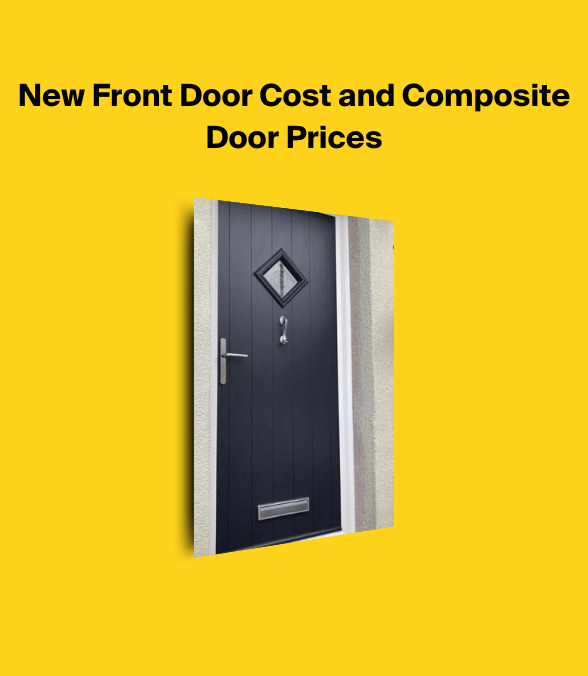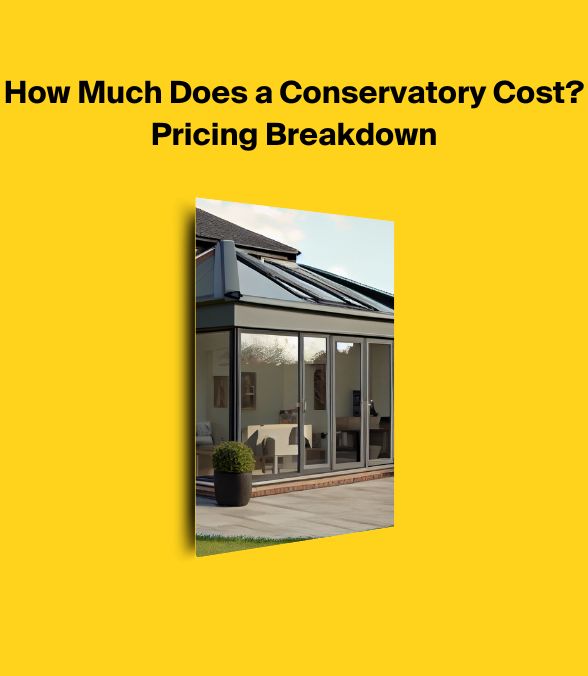If you're thinking about a new front door for your home in the UK, the range of prices and options can seem daunting. Your front door not only defines the look of your home but also plays a crucial role in security and energy efficiency.
Understanding the true costs, from materials to fitting, will help you budget wisely and choose the perfect door for your needs.

What Influences the Cost of a New Front Door?
Several key factors determine the overall cost: the choice of materials, door size, design complexity, and extras such as decorative glazing, side panels, or tolights (glass panels beside or above the door).
Installation is another major cost driver and varies depending on whether you undertake a DIY project or hire professional fitters.
Updated Breakdown of Door Material Costs in the UK
We’ve adjusted the baseline and maximum supply prices by adding £200 to each end of the typical range, reflecting market trends, inflation, and new pricing dynamics for 2025. Below is an up-to-date cost guide combining supply and likely installation expenses:
| Material | Supply Cost (£) | Installation Cost (£) | Combined Total (£) |
|---|---|---|---|
| uPVC | £540 - £1,125 | £300 – £1,500 | £840 – £2,625 |
| Composite | £840 - £2,435 | £300 – £1,500 | £1,140 – £3,935 |
| Timber | £780 - £2,230 | £300 – £1,500 | £1,080 – £3,730 |
| Aluminium | £645 - £1,455 | £300 – £1,500 | £945 – £2,955 |
| Steel | £650 - £2,300 | £300 – £1,500 | £950 – £3,800 |
Installation Costs and What Affects Them
Door fitting in the UK typically costs between £300 and £1,500, depending on door size and additional features like sidelights or tolights. Larger doors or those needing complex installation naturally increase the cost.
Here is a clear breakdown of installation options and their price ranges:
| Installation Type | Average Cost (£) | Benefits | Drawbacks |
|---|---|---|---|
| DIY Installation | £0 - £100 | Save money | Risk of poor fit, void warranty |
| Professional Certified Fit | £300 - £1,500 | Warranty protection, proper fit | Higher upfront cost |
| Supply Only (No Installation) | £540 - £2,435 | Lower initial cost | Need to find separate fitting |
Expert installers ensure your new front door is secure, weatherproof, and meets manufacturer specifications. Incorrect fitting can cause wasted energy, security flaws, and warranty issues.
Material Insights: Understanding Your Options
uPVC Front Doors: Affordable, Low Maintenance, and Reliable
uPVC (unplasticised polyvinyl chloride) front doors are prized for their cost-effectiveness and ease of maintenance. These doors resist warping, rotting, and fading, thanks to their rigid, plasticiser-free construction. Homeowners appreciate that uPVC doors only require occasional cleaning with warm, soapy water to look fresh for years.
Thermally, uPVC doors offer good insulation properties, helping to retain heat during colder months and keep your home cool in summer. Many come with multi-point locking systems and reinforced frames, providing a respectable level of security for the price. Available in a variety of styles and colours, they suit contemporary and modestly styled homes alike, making them a popular choice for budget-conscious buyers.
Composite Front Doors: Durable, Secure, and Energy Efficient
Composite doors combine materials such as glass-reinforced plastics and hardwood to deliver enhanced strength and durability. Composite front doors excel in security features with multi-point locking systems and robust frames, making them a preferred choice for main entrances.
Energy efficiency is another strong suit; composite doors offer superior insulation that can significantly reduce heating bills over time. Their vibrant range of finishes and options for glazing or side panels allow homeowners to customize their entrances without compromising durability. Though priced higher initially, their lifespan of up to 35 years and low maintenance needs often justify the investment.
Timber Front Doors: Classic Beauty with Traditional Appeal
Traditional wooden doors remain favored for their timeless aesthetic, especially in older or heritage-style homes. Crafted often from hardwoods like oak or mahogany, timber doors bring warmth and character to any entrance.
However, these doors require more ongoing maintenance, including periodic staining or painting to protect against weather damage. While timber offers good security and reasonable insulation, its susceptibility to warping or cracking under extreme conditions means upkeep costs can add up. Prices are mid to high-range but reflect the craftsmanship and style many homeowners desire.
Aluminium and Steel Doors: Modern, Strong, and Stylish
Though less common than the above options, aluminium and steel doors offer modern appeal and robust security. Aluminium is lightweight yet strong, providing excellent durability and low maintenance, while steel doors offer high security but can require coatings or treatments to prevent corrosion.
These materials suit homeowners seeking sleek, contemporary designs with advanced security and longevity. Prices vary widely based on design complexity and features, often placing them in the higher cost brackets.
Side-by-Side Cost Comparison of Front Door Types
To help make an informed choice, here’s a detailed comparison highlighting the pros, cons, and price ranges of the main front door materials:
| Feature | uPVC Front Door | Composite Front Door | Timber Front Door |
|---|---|---|---|
| Supply Cost Range (£) | £540 - £1,125 | £840 - £2,435 | £780 - £2,230 |
| Installation Cost (£) | £300 - £1,500 | £300 - £1,500 | £300 - £1,500 |
| Durability | Moderate | Very High | High |
| Security Level | Moderate | High | High |
| Maintenance | Low | Low | High |
| Energy Efficiency | Good | Excellent | Moderate |
| Lifespan (Years) | 15-20 | 30-35 | 20-30 |
| Customisation Options | Limited | Extensive | Moderate |
Summary
In 2025, the cost of a new front door in the UK—including supply and installation—typically ranges from £840 to £3,935, depending on your choice of material and extras. Professional fitting ensures the door performs optimally and maintains warranty coverage. Composite doors stand out for their long-term value despite higher initial costs, while uPVC offers a budget-friendly start.
Ready to upgrade your home with a stylish and secure new front door tailored to your budget? Use online design tools and get quotes from reliable installers to make an informed choice.
How often should I maintain my front door to keep it in good condition?
Maintenance frequency depends on the door material. Timber doors typically need refinishing or repainting every 2 to 3 years to protect against weathering. uPVC and composite doors require less frequent cleaning—usually twice a year with warm soapy water suffices to maintain their appearance and function. Inspecting hinges, locks, and handles annually for lubrication and minor repairs also extends door life.
Can I change the colour or finish of my composite or uPVC door after purchase?
While composite doors are durable and designed to retain their finish, they can be professionally repainted if desired. However, repainting requires proper surface preparation to avoid chipping or flaking. uPVC doors are more challenging to paint because of their plastic composition, and DIY attempts may cause damage. It's advisable to consult a professional for colour changes on these materials.
What are the best ways to improve the energy efficiency of my new front door?
Energy efficiency can be enhanced by choosing doors with high-quality insulation cores, such as foam-filled composite doors. Adding or upgrading weatherstripping, door sweeps, and seals reduces drafts. Installing double or triple-glazed glass panels and ensuring a professional, airtight installation further help in minimizing heat loss.
Are there legal requirements or safety standards I should consider when replacing a front door?
Yes. Front doors must meet fire safety standards and comply with building regulations, particularly for flat entrance doors. Fire-resistant doors require regular inspections to ensure functionality. Additionally, if your property is leasehold or has shared entrances, check with managing agents or landlords regarding maintenance responsibilities and compliance.
Is it worth investing in smart locks or additional security features with my new front door?
Adding smart locks or advanced multi-point locking systems can significantly increase home security and convenience. While they add to the overall cost, many modern doors come pre-fitted or compatible with these features. Consider the level of security you want, local crime rates, and your lifestyle when choosing upgrades.
How can I ensure my front door installation does not void the manufacturer's warranty?
Always use certified professional installers who comply with the manufacturer’s fitting guidelines. Incorrect installation, including poor measurements or DIY fitting, can void warranties and lead to performance issues. Many manufacturers require proof of professional fitting for warranty validity.





